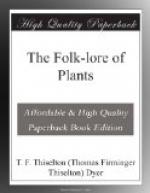There is a notion prevalent in Dorsetshire that a house wherein the plant “bergamot” is kept will never be free from sickness; and in Norfolk it is said to be unlucky to take into a house a bunch of the grass called “maiden-hair,” or, as it is also termed, “dudder-grass.” Among further plants of ill omen may be mentioned the bluebell (Campanula rotundifolia), which in certain parts of Scotland was called “The aul’ man’s bell,” and was regarded with a sort of dread, and commonly left unpulled. In Cumberland, about Cockermouth, the red campion (Lychnis diurna) is called “mother-die,” and young people believe that if plucked some misfortune will happen to their parents. A similar belief attaches to the herb-robert (Geranium robertianum) in West Cumberland, where it is nicknamed “Death come quickly;” and in certain parts of Yorkshire there is a notion that if a child gather the germander speedwell (Veronica chamoedrys), its mother will die during the year. Herrick has a pretty allusion to the daffodil:—
“When a daffodil I see
Hanging down her head t’wards me,
Guess I may what I must be:
First, I shall decline my head;
Secondly, I shall be dead;
Lastly, safely buried.”
In Germany, the marigold is with the greatest care excluded from the flowers with which young women test their love-affairs; and in Austria it is held unlucky to pluck the crocus, as it draws away the strength.
An ash leaf is still frequently employed for invoking good luck, and in Cornwall we find the old popular formula still in use:—
“Even ash, I do thee pluck,
Hoping thus to meet good luck;
If no good luck I get from thee,
I shall wish thee on the tree.”
And there is the following well-known couplet:—
“With a four-leaved clover, a double-leaved
ash, and a green-topped
leave,
You may go before the queen’s daughter
without asking leave.”
But, on the other hand, the finder of the five-leaved clover, it is said, will have bad luck.
In Scotland [3] it was formerly customary to carry on the person a piece of torch-fir for good luck—a superstition which, Mr. Conway remarks, is found in the gold-mines of California, where the men tip a cone with the first gold they discover, and keep it as a charm to ensure good luck in future.
Nuts, again, have generally been credited with propitious qualities, and have accordingly been extensively used for divination. In some mysterious way, too, they are supposed to influence the population, for when plentiful, there is said to be a corresponding increase of babies. In Russia the peasantry frequently carry a nut in their purses, from a belief that it will act as a charm in their efforts to make money. Sternberg, in his “Northamptonshire Glossary” (163), says that the discovery of a double nut, “presages well for the finder, and unless he mars his good fortune by swallowing both kernels, is considered an infallible sign of approaching ‘luck.’ The orthodox way in such cases consists in eating one, and throwing the other over the shoulder.”




